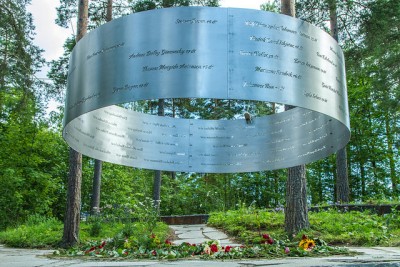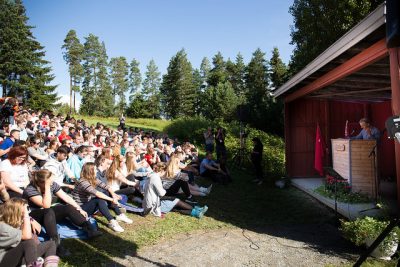The Labour Party youth organization AUF’s annual summer camp reopened Tuesday on the island of Utøya, where 69 members were gunned down by a right-wing extremist terrorist 10 years ago. A new batch of young Labour faithful are visiting the island for the first time, and keen to then launch into the national election campaign.

AUF’s summer camp had to be cancelled last year because of the Corona crisis, and some restrictions remain. Instead of hundreds of young political activists gathering all together, they’ll be attending camp in smaller groups, for three days at a time. That means the island itself will be full of Labour-minded teenagers well into mid-August.
“It’s beautiful here, I think it’s so good to see (the island) and be here,” Marie Stokkan, an 18-year-old AUF member from Skaun in Trøndelag, told NRK. “I’ve of course seen photos, but it makes a much bigger impression to see it for real.”
One of the first things she did was to put a flower on a memorial to victims near the name of a 17-year-old AUF member from Trøndelag who was killed on July 22, 2011. “We’re all very connected to the history here, because it could have been me, my best friends or my chapter leader.” Stokkan herself was only eight years old when the extremist gunman bombed the Labour-led government headquarters in Oslo and then set off a massacre on Utøya in what’s now widely viewed as both a right-wing attack on Labour itself, as well as the government and Norway’s democracy.
“I remember I was in the kitchen at home, that the TV was on and my parents were very upset by the news,” Stokkan told NRK. “I didn’t understand anything.”

Now she and fellow AUF members feel a strong obligation to carry on Labour’s work and try to influence it with their own views, which often vary from the party itself. Most AUF members want Norway’s oil industry, for example, to halt more exploration and thereby cut the country’s own emissions, while Labour itself supports the oil industry. So does a majority in Parliament.
AUF leader Astrid Hoem is also keen to adopt new housing policy, because fewer and fewer young Norwegians can afford Norway’s high housing prices. “We experience that we have less opportunity than our parents’ generation did to buy a home, to get a good job or to study,” Hoem told NRK. “We want Norwegian youth to have high priority in the new government.”
Labour is still leading in public opinion polls and is widely expected to win enough votes in the September national election to form a new government that would oust the current Conservatives’ led coalition. Labour is likely to join forces with the Center Party and the Socialist Left Party, forming a left-center coalition that would make some changes in social policy but relatively few in business, oil and immigration policy.
“The most important thing for us is to get a government that will cut carbon emission and offer new opportunity for youth,” Hoem said. The Center Party, however, is just as pro-oil as Labour, if not moreso, with a poor climate and environmental reputation.
Hoem and other AUF members also want the government to clearly assess and battle racism, extremism and hatred within Norwegian society. She looks forward to the election campaign that will launch into fever pitch during the next few weeks.
“When we meet again next summer, we want to welcome the country’s new prime minister, (Labour Party leader Jonas Gahr Støre) to the camp,” Hoem said.
newsinenglish.no/Nina Berglund

